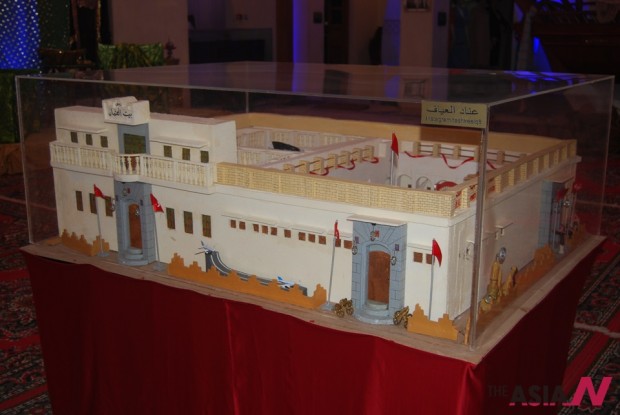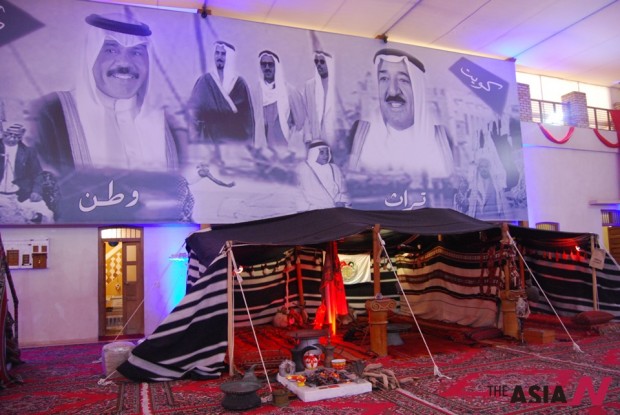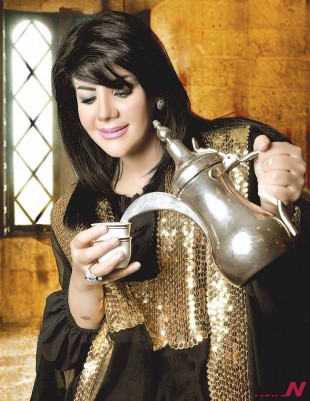Kuwaiti Drama Museum: formulating thoughts of the Gulf
Documentation of Pioneering Arts
“Kuwaiti dramas played a major role in formulating thoughts and conscience of the Gulf public. It offered young generations a precise narration of what parents and grandparents did, and their struggle before the discovery of oil in order to make a living.”
These were the words of the popular tradition team leader and the owner of the idea to found the Kuwaiti Drama Museum, Mr. Anwar Al-Rifai , speaking about the purpose of his historical art project.
The official opening of the museum of drama was in sync with the national holidays in the month of February 2013, under the auspices of His Highness Sheikh Sabah Al-Ahmad Al-Jaber Al -Sabah, Amir of Kuwait.
The idea is a very great and inspiring one, which is the first of its kind in the Arab region. The museum, which has been obtained by the Ministry of Information and Kuwait TV, unveiled decades of enlightenment and creativity that led a galaxy of intellectuals and artists to pave the way for the generations that came after.
The stories of those generations were bright examples of determination and defiance when potential was limited and the talent and message of faith in art was a powerful incentive for them to continue and succeed.
Preserving Kuwaiti drama history
The Kuwaiti Drama Museum is located in Bait Al-Othman (The Othman Family House) in Hawali district. It houses everything related to the drama business since the early sixties of the last century such as costumes, accessories, editing machines, photography reels and lighting units, as well as some building replicas of the old neighborhoods such as the Kuwaiti Market (Kuwaiti Souq), showing the old way to maintain civilized models of traditional Kuwait architectural monuments at the time.
Since the early sixties of the last century, the art movement in Kuwait had its own characteristics. Perhaps, its presence was the most influential in the Gulf region. Great Egyptian director and actor Zaki Tulaimat had a significant role in the advancement of drama art here, as he visited the country two years before its independence, when he prepared an integrated methodological study in order to develop a plan for the formation of a real theatre movement in Kuwait.
Two years later, Mr. Tulaimat returned to Kuwait to apply his plan, and then he founded the Arab Theater Group in 1961, which was joined by a distinctive group of Kuwaiti creative figures, who had proven their talent and presented works featured in the drama along with theatrical performances.
Most of those pioneering names are still continuing to surprise their audience. We have examples in the unique comedian Abdul-Hussein Abdul Redha, who acted, along with his colleagues Khaled An-Nafisi, Ali Al-Mufidi and Saad Al-Faraj, in the most famous serial in the history of Gulf drama: “Darb Al-ZalaQ”. (The Street of ZalaQ)
Such names, which contributed strongly in the success of Kuwaiti drama, were to be at the forefront in the Gulf for decades until the late eighties of the last century. Abdul-Hussein Abdul Redha established his arts center for production and distribution some three decades ago, and launched the Fonoon – Arts TV comedy channel in 2006, which is currently an important tribute to the artistic heritage of Kuwait, especially through comedy plays and operettas, starring and co-written by the great artist himself.
The works telecasted included Fate, Patience is the Key to a Solution, Al- Hayalala “The Crooks”, right down to the serial Abu millions “The Owner of Millions” that was presented during the holy month of Ramadan in 2013, when all Arabs have the most TV viewership.
What is generally known of the Gulf society and its tradition that kept women away from working, especially at the beginning of the last century, was reflected clearly when there was an urgent need for the presence of women in business theater and drama. The great Egyptian director Zaki Tulaimat faced such a problem when he founded the Arab Theater Group. Then, the two actresses, Mariam Saleh and Mariam Al-Ghadban, determined to stand on the stage along with their colleague actors, performed the first play Saqr Quraish, sowing the first seed of Gulf women in the land of theater.
When we talk about Kuwaiti drama, we cannot forget the wonderful duet: Hayat Al-Fahd and Suad Abdullah. They both began in the sixties of the last century and had together their own fingerprints in several brilliant dramas like Roqayya and Sakina, Say Peace to the World, Aunt Qamasha, A Private Lesson, No Longer Came Back and other successful series. After a lapse of almost thirteen years, they reappeared together in the series The House of our Father, presented in the last month of Ramadan.
Kuwaiti women in Gulf dramas
Successive generations and works of art in Kuwait continued to provide famous names such as Ilham Al-Fadalah, Intesar Al-Shrrah, Hassan Ballam, Mohammed Mansour and other drama stars to Kuwait. They could get Arab and international credit for their works, like in the case of the young director and writer Sulaiman Al-Bassam whose works were inspired by both Shakespeare and Arabic literature.
Kuwaiti art projects did not stop, which helped it to achieve new versions that could send Kuwaiti drama back to race with works of art in the Gulf region. Also, they provided themes that could attract the largest segment of viewers.
The new project is the biggest dream for Kuwaiti drama makers in general, but it is also the dream of the Kuwaiti Drama Museum man, who wants to establish the largest heritage village as a stage for filming dramas instead of studios and indoors to overcome the problem of non-availability of open areas for filming the outdoors. It is aimed to be the center of drama in the Arabic Gulf region according to a well-planned and timed project.
Yes, the challenges are huge, but dreams do come true with proper planning, which is only reached by vigilant consciences and hearts in love for the country in various fields of art, thought and creativity.




























































